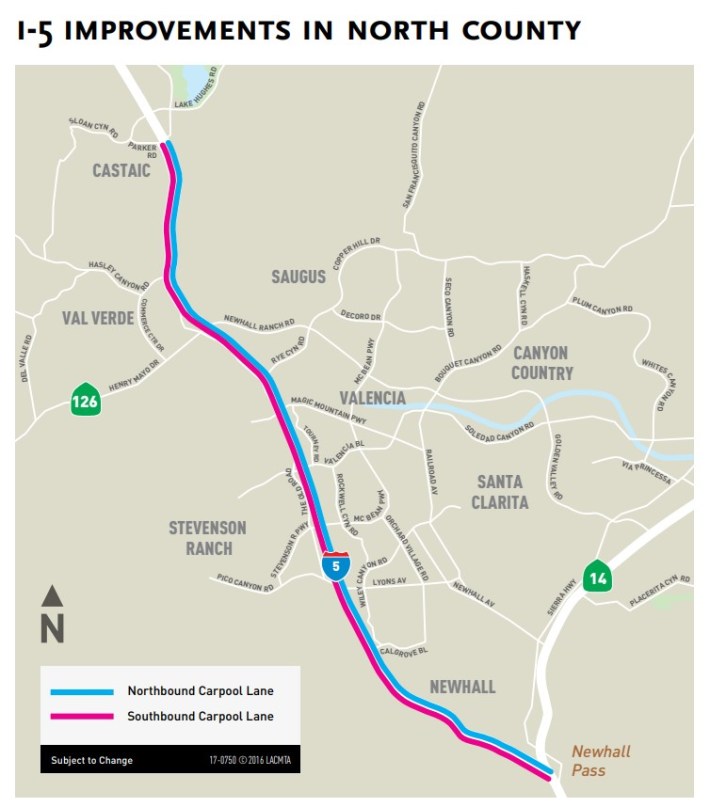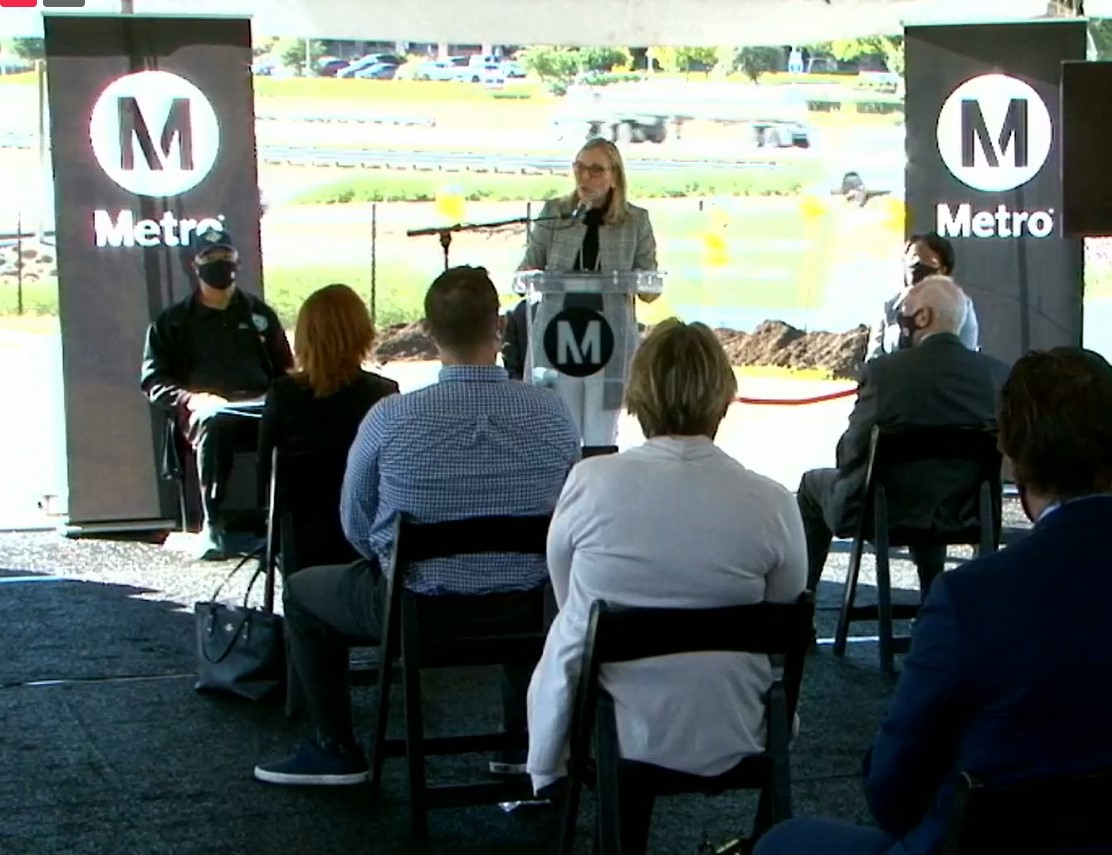This morning, Metro broke ground on another project to widen the 5 Freeway. Metro's I-5 North County Enhancements Project will widen about thirteen miles of the freeway through the relatively suburban city of Santa Clarita, at a cost of $679 million.
This new 5 Freeway widening joins Metro's $1.9+ billion I-5 South widening (from Orange County to the 605) and $1.3+ billion I-5 North widening (Burbank area) projects, both under construction for several years, plus Metro's planned $4+ billion 605 Freeway widening project, which would include demolishing hundreds of homes to widen the 5 Freeway in and near the city of Downey.
This morning's groundbreaking ceremony speeches were streamed live on Facebook.

It's not clear whether it's a good or a bad sign that many of today's speakers defensively decried the harms that these sorts of freeway widening projects cause. Instead of blithely praising more and more lanes, several speakers deflected concerns - noting how different this freeway widening is compared to past harmful widening. But many of these new equity-washing and greenwashing statements are just false.
Metro Boardmember and County Supervisor Kathryn Barger claimed that, due to new high-occupancy vehicle (HOV) lanes, this freeway widening project will "help take cars off the road and reduce pollution." No freeway widening project has ever delivered on these sorts of promises - and this one will not.
Metro CEO Stephanie Wiggins also claimed that this freeway widening would bring "better air quality," though she mostly emphasized the project's benefits as improving driver safety, creating jobs, and making good on Metro's promises to voters.
Wiggins noted that the Metro-Caltrans partnership "acknowledges some of the inequities of freeway projects in the past," but she lauded this freeway widening as "charting a fresh path" that serves as a regional and state model for "truly equitable outcomes achieved through fair processes and community support."
Glendale City Councilmember Ara Najarian, who alongside Barger represents the North County on the Metro board, aimed a significant portion of his remarks squarely at advocates pushing for Metro to stop harmful freeway widening projects. Today Najarian stated:
...some of you may be wondering: why is Metro building another freeway project? Well maybe not some of you, but others - others in other parts of the county - are wondering that. Haven't freeway projects lost favor with the public? Don't these freeway projects induce demand for vehicle trips on our local freeways?
And we've experienced that with a couple projects. But this project is definitely not one of those projects.
To be clear, Metro continues to focus on building freeway operational and safety improvement projects to address the current validated congestion and deficiencies. The project we're now starting - as the supervisor said - will build carpool lanes and extend truck lanes to improve the efficiency and safe operation of this portion of the I-5.
Now specifically we'll be making adjustments to extend the existing truck lanes beyond their current termini near the I-5/SR-14 interchange to allow for a separation of trucks and passenger vehicles. This will enhance roadway operation and improve safety - and it will reduce and hopefully prevent vehicular accidents.
But more importantly we will not be adding any more mixed-flow lanes as part of this project. And the good news is the project will generally be within the existing freeway right of way and will not have any property impacts.
Even city of Santa Clarita Mayor Bill Miranda touched on the city's advocacy for "expanded public transportation options." This assertion flies in the face of Santa Clarita's routinely claiming that the city has "no unmet transit needs" and can therefore shift certain public transit funding toward projects focused on serving drivers.
In addition to what's already been noted above, there's a lot more that's misleading and outright false in today's statements. Below are a few rebuttals to the above assertions:
Myth: This freeway widening will not induce driving
Najarian's assertion that this project will not induce more driving is false. Of course, adding these truck lanes and HOV lanes will induce additional driving. Truck drivers and carpool drivers shift to the new lanes, and then more drivers will drive more to fill the capacity vacated. Research has shown this to be the case: widening highways induces driving. Adding capacity to "address deficiencies" induces more driving. Najarian and Metro continue to be in denial (and, worse, to repeat pernicious myths) about how Metro freeway projects result in more driving.
Even Najarian's assertion that this project "will not be adding any more mixed-flow lanes" is false. The project mainly adds truck and HOV lanes, but it does add about 2.5 new miles of auxiliary lanes (lanes that extend between on and off ramps.) Auxiliary lanes are general purpose lanes. These mixed-flow auxiliary lanes are in this project. They add capacity. They induce more driving.
Note that Najarian is largely repeating earlier false assertions by Metro highway builders that Metro highway projects don't induce driving. He also more or less directly quoted Metro's highway chief Abdollah Ansari in calling to "address the current validated congestion."
Myth: No (or minimal) demolitions equals equity
Though it does have some property impacts (two parcels), that this project doesn't demolish homes doesn't necessarily mean that it is good for equity. Spending hundreds of millions of dollars to widen freeways focuses funding on improving mobility solely for people with high enough incomes to afford cars.
It's important that Metro and Caltrans are acknowledging that neighborhood demolitions are - and have long been - the worst and most racist impact of freeway widening. But just minimizing one negative - demolitions - does not mean a freeway project actually addresses inequities. Metro needs to do a lot more than just minimize one negative. If the agency is to truly work for equity, it needs to positively prioritize investments that contribute to community and environmental health, as well as enhanced mobility - starting with low income communities of color.
Myth: Harmful highway projects are just in the past
Caltrans and Metro have been evicting people from their homes along the 71 Freeway in Pomona throughout 2021 - basically right now. Caltrans and Metro continue to plan projects - on the 5, 605, and 710 - that would demolish hundreds of homes.
Wiggins acknowledging "inequities of freeway projects in the past" and Najarian's past tense statement that Metro "experienced [induced demand] with a couple projects" are both gross understatements that downplay the current harms currently being done by Metro and Caltrans freeway widening.
Myth: The climate can afford more freeways
Mayor Miranda touched on wildfire dangers as a concern in support of the 5 Freeway as an evacuation route. But the mayor failed to make the connection that the freeway is a huge part of what is increasing the danger of wildfires and other climate disruption. Transportation - mainly driving - is the largest source of greenhouse gas emissions in California.
This project will result in more driving, more emissions, more wildfires, and a worsening climate emergency.
Advice: Try telling the truth
Does anyone really believe that this (or any other) freeway expansion will really clean the air? Does this (or any other) freeway widening truly advance equity? Is widening a suburban highway honestly an equity model for other projects in the region and the state? Is Metro really spending hundreds of millions of highway dollars to widen a freeway in a way that won't result in more driving?
These claims are all disproven.
Ridiculous.
False.
Frankly, lies.
Yes, at a groundbreaking speakers should praise the project at hand. But, a modest suggestion: Metro leadership should try sticking to the truth.
There are valid actual benefits that this project can reasonably be expected to accomplish. Despite some harms, this widening project will improve driver safety and will facilitate goods movement. It does create construction jobs. (And, yes, along with the false claims outlined above, these actual benefits were also touted by speakers today.)
If Metro and its leadership are ever going to make progress on agency priorities like equity and climate, then they need to stop asserting demonstrably false benefits of their highway widening projects.






